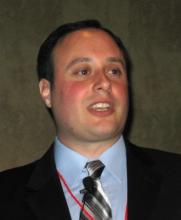TUCSON, ARIZ. – Psychosocial interventions for schizophrenia are not part of typical community practice, but compelling evidence indicates they ought to be because they effectively address aspects of the disease that antipsychotic medications do not, according to Nicholas J.K. Breitborde, Ph.D.
"It’s just not enough to say that these treatments work. What we really need to do is incorporate them into the usual care that individuals with schizophrenia are receiving," he said at the annual psychopharmacology review sponsored by the University of Arizona.
Standard therapy for schizophrenia today is antipsychotic medication. But numerous studies demonstrate that antipsychotic agents combined with psychosocial intervention provides better outcomes than does medication alone, noted Dr. Breitborde, director of the early psychosis intervention center at the university.
For example, in one recent study 1,268 patients with early-stage schizophrenia were randomized to antipsychotics only or to antipsychotics plus 12 months of psychosocial intervention consisting of family intervention, skills training, psychoeducation, and cognitive-behavioral therapy carried out during 48 group sessions.
The rate of treatment discontinuation or change was 33% in the combined therapy group, significantly lower than the 47% rate with medication only. The combined treatment group also had a 43% lower risk of relapse than did controls, as well as greater improvements in insight, social functioning, quality of life measures, and activities of daily living. In addition, they were more likely to be employed or in school (Arch. Gen. Psychiatry 2010;67:895-904).
Concerns about the cost of psychosocial interventions have often limited their availability. But Dr. Breitborde and his colleagues recently showed in a statistical simulation study that 2 years of multifamily group psychoeducation for patients with first-episode psychosis and their families was at the very least cost effective, and in scenarios where the clinical benefits were in line with those reported in some prior studies, the intervention was actually cost saving. Moreover, when the intervention was provided for a longer period of 2, 5, or 10 years, it became unequivocally cost saving, with total costs of care half or less of those on medication only (Psychiatr. Serv. 2009;60:1477-83).
Patients enjoy psychosocial interventions. That’s why a recent meta-analysis of 74 randomized trials of psychosocial treatments in patients with schizophrenia spectrum disorder showed a dropout rate of just 13%, compared with an average of 42% in pharmacotherapy-only trials (Schizophr. Res. 2010;121:266-70).
"Symptom management is only one of many treatment goals for individuals with schizophrenia. They want improved quality of life, control of depression, meaningful relationships with others, and to go back to work," Dr. Breitborde said. "These are areas where we know antipsychotic medications are not terribly effective."
He said he had no relevant financial disclosures.


